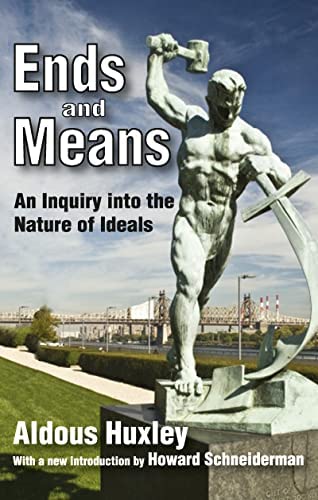Newly released
This book is new and will be uploaded as soon as it becomes available to us and if we secure the necessary publishing rights.

Ends and Means Book PDF
(0)
Author:
Aldous HuxleyNumber Of Reads:
63
Language:
English
Category:
fieldsSection:
Pages:
340
Quality:
excellent
Views:
711
Quate
Review
Save
Share
Book Description
Contemporary intellectuals still struggle over the relationship of ends to means, especially in political discourse. Pacifism is still an important topic today, as terrorism and dictatorial states abound. Many will find solace in Ends and Means, while others will find the book only a case study of the relationship of ethics to politics.
Aldous Huxley examines common issues in a unique fashion. How can the regression in charity through which we are living, and for which each one of us is in some measure responsible, be halted and reversed? How can existing society be transformed into the ideal society described by the prophets? How can the average sensual man and the exceptional (and more dangerous) ambitious man be transformed into a non-attached being, one who can create a society significantly better than our own?
Huxley discusses the relationship between the theories and the practices of reformers and the nature of the universe. He argues that our beliefs about the ultimate nature of reality help us formulate conceptions of right and wrong, not only in our private life, but also in the sphere of politics and economics. Far from being irrelevant, our philosophical beliefs are the final determining factor in our actions. This provocative classic volume, now available in paperback, will continue to stimulate discussion and thought.
Aldous Huxley
Aldous Leonard Huxley (26 July 1894 – 22 November 1963) was an English writer and philosopher.
He wrote nearly 50 books, both novels and non-fiction works, as well as wide-ranging essays, narratives, and poems.
Born into the prominent Huxley family, he graduated from Balliol College, Oxford, with an undergraduate degree in English literature. Early in his career, he published short stories and poetry and edited the literary magazine Oxford Poetry, before going on to publish travel writing, satire, and screenplays. He spent the latter part of his life in the United States, living in Los Angeles from 1937 until his death.
By the end of his life, Huxley was widely acknowledged as one of the foremost intellectuals of his time.
He was nominated for the Nobel Prize in Literature nine times, and was elected Companion of Literature by the Royal Society of Literature in 1962.
Huxley was a pacifist.
He grew interested in philosophical mysticism, as well as universalism,addressing these subjects with works such as The Perennial Philosophy (1945), which illustrates commonalities between Western and Eastern mysticism, and The Doors of Perception (1954), which interprets his own psychedelic experience with mescaline. In his most famous novel Brave New World (1932) and his final novel Island (1962), he presented his vision of dystopia and utopia, respectively.
Huxley completed his first (unpublished) novel at the age of 17 and began writing seriously in his early twenties, establishing himself as a successful writer and social satirist. His first published novels were social satires, Crome Yellow (1921), Antic Hay (1923), Those Barren Leaves (1925), and Point Counter Point (1928). Brave New World (1932) was his fifth novel and first dystopian work.
In the 1920s, he was also a contributor to Vanity Fair and British Vogue magazines.
Book Currently Unavailable
This book is currently unavailable for publication. We obtained it under a Creative Commons license, but the author or publisher has not granted permission to publish it.
Rate Now
5 Stars
4 Stars
3 Stars
2 Stars
1 Stars
Ends and Means Quotes
Top Rated
Latest
Quate
Be the first to leave a quote and earn 10 points
instead of 3
Comments
Be the first to leave a comment and earn 5 points
instead of 3